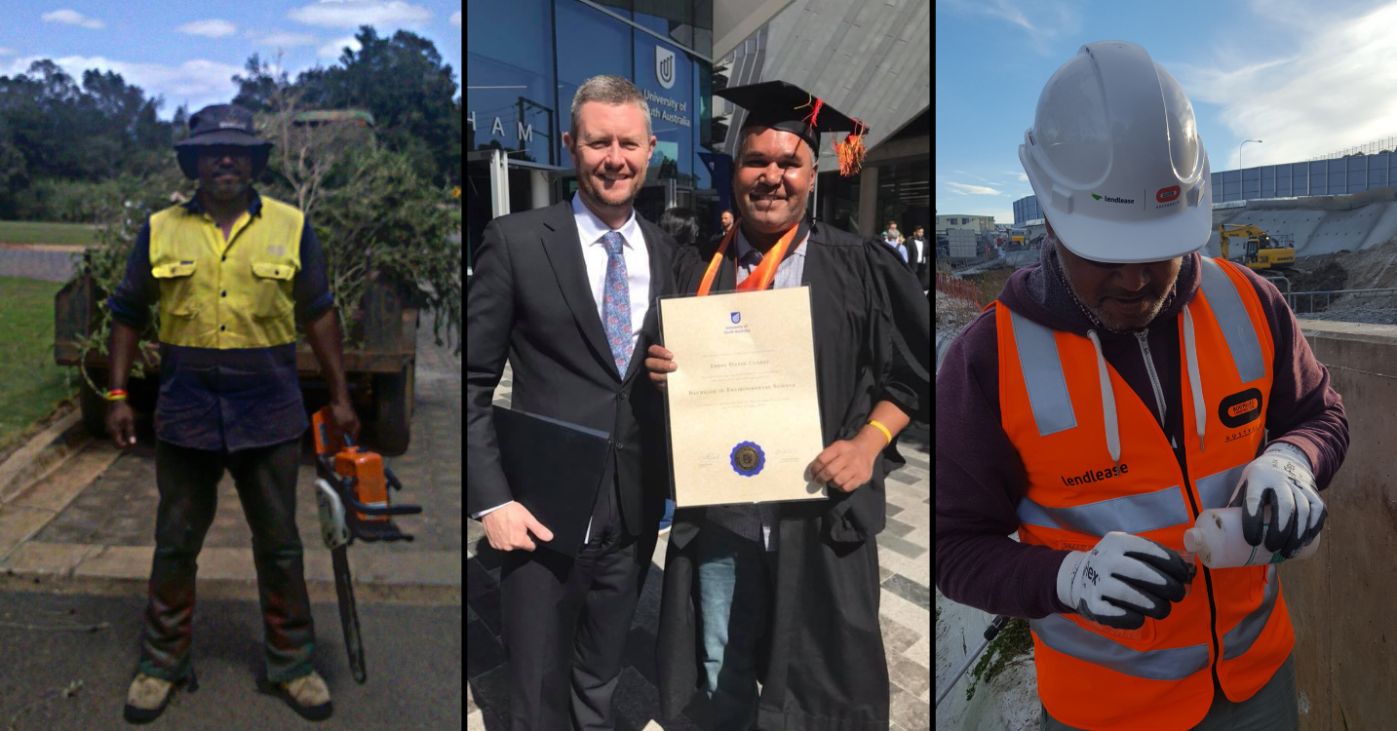UNE’s Aboriginal Employment Officer Errol Clarke has worn a multitude of hats during his varied career – as a mechanic, gardener, chef, cricket-pitch curator, landscaper and grave-digger. (Yes, you heard right.) And working in Smithfield Memorial Park Cemetery in Adelaide taught Errol something truly valuable – the importance of being in a role you find rewarding.
“Some might consider it a morbid job, digging graves, burying people and interring ashes,” Errol says of his former team leader position. “But it was a beautiful place of celebration and reflection – with three lakes and lovely lawns and rose gardens. I took a lot of pride in keeping the cemetery inviting and attractive, to serving the community, and we got lots of compliments from visitors.”
Indeed the pursuit of job satisfaction, not money or status, has guided Errol throughout a career that has taken some unexpected turns.
By that stage in his life Errol had completed two certificates in horticulture and had a future working in ecology mapped out, but the cemetery role proved so satisfying that he stayed for four years. Indeed the pursuit of job satisfaction, not money or status, has guided Errol throughout a career that has taken some unexpected turns through local government, private enterprise and higher education.
“My progression has been slow, but taking a series of small steps has got me to where I am today,” he says. “I’ve taken a scaffolded approach to knowledge generation. Getting a degree was in the back of my mind from my mid-20s, but I didn’t actually get that degree (a Bachelor of Environmental Science) until I was 36, when I became the first in my family to study at university.”
He’s had his fair share of disappointments and knock-backs, too, but affable Errol believes these five basic tenets have helped him to build resilience and confidence, in work and life.
Set yourself realistic and manageable goals
“Find what it is you want, set some goals and then pursue them. Performance and individual learning goals have provided me with direction and focus throughout my career. Having a goal to aim for can help boost your self-esteem and remind you that you are up to the challenge.”
Take stock of your career at regular intervals
“I like to set annual and longer-term (3-5-year) professional and personal goals, and it’s important to review both the goal and your progress periodically.”
Always look for challenges but also job satisfaction - the job has to be the right fit
“Every time I developed skills, I wanted to gain more. I’m not after a six-figure salary but a challenging role that is meaningful to the people I am servicing. After I finished my degree I did a postgraduate certificate in management and I’ve since moved from ecology to human resources. At UNE I’m enjoying helping to create pathways to study and employment for Aboriginal students; it’s my job to broaden their horizons and give them a vision. I think I have a role to play not just as an Aboriginal Employment Officer but as an Aboriginal man.”
Forget second-guessing yourself; it gets you nowhere
“We can all feel anxiety when we step out of our comfort zone, and question whether we are up to the task. Some people embrace that, while others prefer to maintain the status quo. But sometimes you just have to give it a go. And if you are not successful, you get feedback on your application and the experience of applying. I’ve always been prepared to have a throw at the stumps and I’ve been lucky to have had a couple of strong mentors to lean on.”
Never be afraid to continue learning
“Whether it was putting my name forward for a secondment or an opportunity to gain further formal experience, it’s always been important to me to progress myself. At one point I was looking for the next step up, so I went to night school at TAFE to do a Conservation and Land Management diploma while working full-time. When another employer rejected my application for study leave to complete my Bachelor of Environmental Science I took the bold move to resign and become a full-time student at 36 years of age. I’m now looking to do a Masters of Business Administration. Things keep changing and you have to keep up with trends. I’m still gaining knowledge every day.”
Finally, Errol cautions against underestimating your individuality and lived experience.
“Everyone is different; we will each take different career paths,” he says. “The one that I have taken has equipped me with the autonomy, leadership and confidence to perform in my current role at UNE. All my life experiences have been valuable, even starting out as an apprentice with a Cert. III and getting paid $11.50 an hour. Today, I’m using that understanding to connect with a new generation of students with dreams of their own.”


